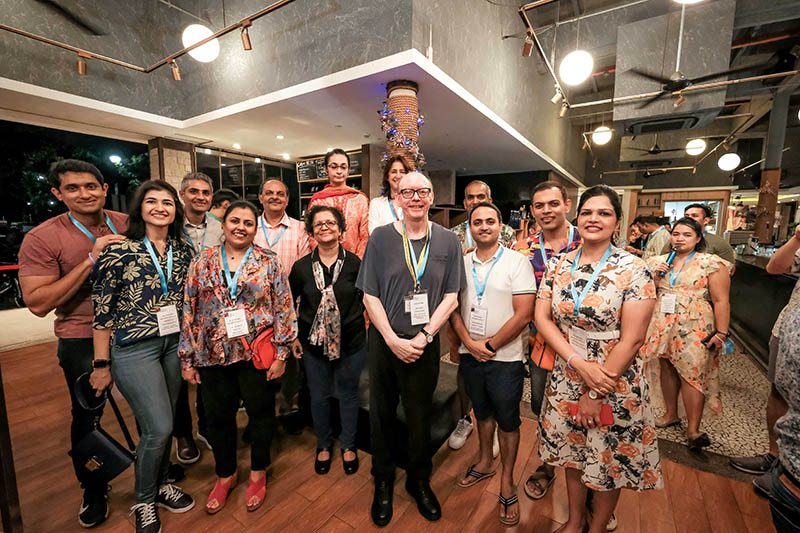Interview with Dr Gary Stockport, Dean EMBA & Professor of Strategy
The world of business education is an intensely competitive one, and executives looking to enhance their career prospects through appropriate training have a wide range of options. Here, Dr Gary Stockport of SP Jain School of Global Management outlines the school’s offering and gives an insight into its aim of delivering an innovative, principled business education.
Lovely to meet you, Dr Stockport! You had an impressive academic career before becoming the Dean of the EMBA and Professor of Strategy at SP Jain School of Global Management. What is your vision and strategy for the university during this challenging time?
Lovely to meet you too! The Vision of SP Jain School of Global Management (SPJ) is, and I quote: “To be an influential, futuristic international business and technology higher education institution recognised for leading innovative, principled education and applied research”. In short, SPJ wants to be at the forefront of management education and strategically intends to be an innovative first mover, whether this applies to global strategy, curriculum design, or using leading-edge technology to enrich the student experience, etc. Our school brand’s reputation is “wrapped” around this. Our EMBA “dovetails” into the school’s vision. For example, we continually innovate within the EMBA to strategically position it as one of the best EMBA programmes in the world. We also believe in CANI – constant and never-ending improvement. Sometimes, big changes can be made through the implementation of small incremental changes over time.
As one of India’s leading management schools, SP Jain takes pride in being a driver of a personal transformation journey of self-discovery. How would you sum up the “essence” of the institution and what makes it worthy of being number 12 in the Forbes List?
We are an institution that prides itself in being at the leading edge of management theory and practice. We have faculty who are world-class teachers and bring many years of applied work experience into the classroom. SPJ faculty have also published in high-quality academic journals, as well as more practitioner-oriented research outputs. In short, our faculty represents a dynamic capability which has built a distinct strategic difference for our school. This is the “essence” of the school.
SP Jain’s Executive MBA (EMBA), in particular, is a carefully crafted balance of theoretical and practical application of knowledge, with flexibility built into the design. What can participants expect from this course?
Participants can expect a truly transformational experience where they will become better general managers as well as future leaders. SPJ offers a very rich programme of learning that assists career acceleration and adaptation. The EMBA is coherently designed within a number of terms which are structured as follows: The Fundamentals of Managing; Becoming a Senior Leader; Being a Leader; Specialisations – Electives, in the areas of marketing, finance, operations and entrepreneurship. The programme culminates in students undertaking an applied strategy project which investigates a real business issue with proposed solutions for their employer. Many of the projects undertaken have proved to be of major strategic significance, for example the identification of a new product or service to help strategically position the organisation for the future.
SP Jain has become widely known for its inspiring global faculty. Could you share some insights about that, and how it leads to a more diverse experience for the students?
As mentioned earlier, SPJ prides itself on the quality of its staff. As the school has campuses based in Dubai, Singapore, Mumbai, and Sydney, the global diversity of staff is ensured. EMBA assistant deans hail from Canada, Switzerland, and India, and bring a global perspective to strategic thinking with regard to the EMBA. If I can humbly talk about myself as a specific example, I have lived and worked in the UK, New Zealand, Australia, South Africa, Australia (again), and the UAE, in that order. I have also consulted with over 200 private and public sector global organisations. In sum, all this enables SPJ to provide a truly global and real-world rich learning experience, which perhaps other institutions cannot readily imitate.
Talking of students, we have also learned that SP Jain has a very strong student and alumni network. How has the school managed to knit such a strong connection with everyone, and do you often organise events to promote this and keep it going?
We regularly hold networking events where current EMBA students can network with alumni. These events are held both face to face and online. A recent EMBA event held in Singapore attracted some 130+ people. Therefore, current students can find out about from alumni the “fruits” of their 18-month strategic investment, including some quantitative measures about career acceleration and adaptation. Examples have included EMBA alumni who have switched careers, such as from a corporate career to starting their own business. This is quite common.
Can you tell us more about the Engaged Learning Online (ELO) technology that powers your EMBA programme?
Our ELO technology platform mimics everything within a physical learning classroom along with having a global reach; indeed, we have students from 20+ countries attending our Global OL EMBA. This includes facilitated faculty discussion in real time, speaking, and chat using group break-out rooms. The technology is now so specific and sophisticated that you can literally see the “whites of a student’s eyes” on the screen. Students’ visual reactions to, say, questions can be clearly seen and monitored by faculty. Personally, I love teaching via a traditional classroom and through ELO.
How important do you think it is to familiarise yourself with the latest technologies in the world? What are your thoughts on artificial intelligence and metaverse? Do you think their impact will grow to different heights or eventually die down?
Students need to be aware of the latest developments, whether AI, machine learning, the Internet-of-Things, or disruptive business models, etc. All these are interwoven throughout the curriculum. This is done through analysing case studies, simulations, and bringing authoritative guest speakers into the classroom.
More than ever, corporations are valued for their contributions to social development and global sustainability. What is SP Jain’s strategy to produce the socially responsible leaders and managers of tomorrow that global corporations need?
Courses run at SP Jain EMBA specifically cover topics such as corporate governance and ethics. We recognise the need to build authentic leaders who are aware of how their decisions and actions impact upon many stakeholders, both positively and negatively. Our EMBA specifically considers climate change and the circular economy. Up-to-date ethical issues such as the recent case of Elizabeth Holmes and Theranos are considered. This story is about a blood-testing product which never worked, but the company’s value “ballooned” to some US$9bn, of which Elizabeth Holmes was worth US$4.5bn, before it then “nose-dived” to literally zero. She has recently been convicted on three counts of wire fraud and one count of conspiring to commit wire fraud, and is currently awaiting sentencing.
What would you say has been the most important element in your messaging for your future global leaders?
Global leaders are not born, but made, and doing an EMBA will significantly help (along the way). Global leaders need to have a bundle of capabilities, such as strategic thinking, critical thinking, and the ability to implement with speed, agility, and flexibility. This includes the on-going capacity to value-add for their current and future employers. Soft skills, for example the ability to present with confidence and negotiate effectively, etc., are also fundamentally important. SPJ offers a soft-skills learning framework through what it calls its ECAP (Executive Career Accelerated Program). Broadly, ECAP is divided into a number of key components: one-on-one coaching (for example, feedback on CV and LinkedIn profile), masterclass sessions delivered by C-suite executives, toastmaster club, and alumni sessions.
The university was reported to have around a 300 per cent enrolment growth amid and post pandemic. How would you characterise your experience during the pandemic? What challenges did you face as a global institution with overseas campuses, and what opportunities emerged as a result?
The worst of times can also bring out the best of opportunities. Like other institutions, COVID-19 brought very many on-going challenges to SP Jain, with individual campuses having to close, reopen, and then close again. Furthermore, teaching delivery moved from face to face to online. However, within this complex and fast-changing environment, the school was able to seize on the strategic investment it had made in ELO technology a year before COVID-19. We were therefore ideally placed for online delivery. We do not consider this to be luck, but rather good strategic judgement. SPJ had always felt that the future would likely become a blended mixture of face to face and online, but the question was always when, and what might be the ideal combination. “The jury is still out” on this one.
Why do you think more businesses are looking to upskill their employees through executive education, particularly?
Businesses appreciate the impact such training can have immediately back at the workplace. In fact, SPJ has been significantly increasing its offering in the executive-education (Ex-Ed) market space over the past two years. This includes open Ex-Ed programmes, as well as customised Ex-Ed programmes, and the school has been developing an enviable reputation within this area. Clearly, there are synergies with this development and the EMBA. For example, a participant “tastes” an Ex-Ed programme and then wants to develop themselves further through undertaking a part-time EMBA.
SP Jain has many alumni in senior positions. What, according to you, is something that sets them apart from other colleges?
Many SP Jain alumni appreciate the quality of learning they have had when studying and wish to give back to the institution as a consequence. Alumni effectively showcase our brand. They have had a “holistic” professional and personal development through undertaking the EMBA and acquired the confidence to make important strategic decisions combined with the ability to implement efficiently and effectively.
Globalisation has opened the doors for institutions of higher learning to build strong international networks and create opportunities to bridge continents in collaborative research and other global outreach programmes. You have campuses in Sydney, Mumbai, Singapore, and Dubai. How would you describe SP Jain’s global footprint today and what are your international ambitions for the future?
SPJ already has a well-established global footprint and a recognised global brand name through its Dubai, Singapore, Mumbai, and Sydney campuses. These cities are also important global financial hubs. The school is now harnessing its world-class leading-edge technology to roll out its global presence even further. While other Institutions were struggling during COVID-19, the SPJ EMBA became stronger and stronger. We now have students doing our part-time EMBA from over 20 countries.
You’ve mentioned that “India will be one of the global growth engine countries of the world over the next 30 years”. What about the region makes investment – in education or otherwise – appealing?
I believe India will become a global growth engine over the next decade. I can certainly see this from my 20 or so trips to India over the past six years. I know very well that EMBA students from India particularly value a comprehensive and challenging EMBA programme and curriculum. They want value for money from the strategic investment they make in their EMBA studies, given the money, time, and trade-offs required. Generally, they are hardworking and appreciative of receiving a world-class student experience.
As the Dean of SP Jain School of Global Management, how would you infuse tomorrow’s leadership with meaning?
I think leadership capability is developed through continual practice, day in, day out. In my view, as mentioned earlier, leaders are not born, but rather made through constant development. The SPJ EMBA gives students the knowledge, skills, and capabilities to become better general managers, as well as more effective future leaders. I believe the best way for me to emphasise this is through “showcasing” my own leadership capability, as I also have an MBA. Doing an MBA was the best strategic investment I have ever made. I try to do this through my actions each and every day and thus hopefully become a strategic leader role model for others to follow. It’s all about demonstrating experience, wisdom, and courage. There is never one right answer when we face a strategic dilemma and it’s all about making good strategic decisions based upon sound judgement. In reality, this is easier said than done. However, I feel sure that people who have an SPJ EMBA will dramatically increase the probability of a much better outcome, compared with not having one.
This article was originally published on September 27, 2022.
Executive Profile

Dr. Gary Stockport is a Professor of Strategy, Dean Executive MBA, and the Chair of Examination Board. He currently sits as the Dean Executive MBA & Professor Strategy at SP Jain School of Global Management, Dubai, UAE. He completed his PhD in Philosophy at Cranfield School of Management, UK and MBA at University of Warwick, UK. Aside from management roles, Gary has supervised many Honours, HDR, DBA and PhD students to successful completion.






































